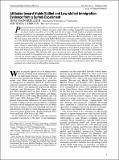Attitudes toward Highly Skilled and Low-skilled Immigration: Evidence from a Survey Experiment
Author(s)
Hainmueller, Jens; Hiscox, Michael J.
DownloadHainmueller_Attitudes Toward.pdf (190.7Kb)
OPEN_ACCESS_POLICY
Open Access Policy
Creative Commons Attribution-Noncommercial-Share Alike
Terms of use
Metadata
Show full item recordAbstract
Past research has emphasized two critical economic concerns that appear to generate anti-immigrant sentiment among native citizens: concerns about labor market competition and concerns about the fiscal burden on public services. We provide direct tests of both models of attitude formation using an original survey experiment embedded in a nationwide U.S. survey. The labor market competition model predicts that natives will be most opposed to immigrants who have skill levels similar to their own. We find instead that both low-skilled and highly skilled natives strongly prefer highly skilled immigrants over low-skilled immigrants, and this preference is not decreasing in natives' skill levels. The fiscal burden model anticipates that rich natives oppose low-skilled immigration more than poor natives, and that this gap is larger in states with greater fiscal exposure (in terms of immigrant access to public services). We find instead that rich and poor natives are equally opposed to low-skilled immigration in general. In states with high fiscal exposure, poor (rich) natives are more (less) opposed to low-skilled immigration than they are elsewhere. This indicates that concerns among poor natives about constraints on welfare benefits as a result of immigration are more relevant than concerns among the rich about increased taxes. Overall the results suggest that economic self-interest, at least as currently theorized, does not explain voter attitudes toward immigration. The results are consistent with alternative arguments emphasizing noneconomic concerns associated with ethnocentrism or sociotropic considerations about how the local economy as a whole may be affected by immigration.
Date issued
2010-03Department
Massachusetts Institute of Technology. Department of Political ScienceJournal
American Political Science Review
Publisher
Cambridge University Press
Citation
Hainmueller, Jens and Michael J. Hiscox. “Attitudes toward Highly Skilled and Low-skilled Immigration: Evidence from a Survey Experiment.” American Political Science Review 104.01 (2010): 61-84.
Version: Author's final manuscript
ISSN
0003-0554
1537-5943